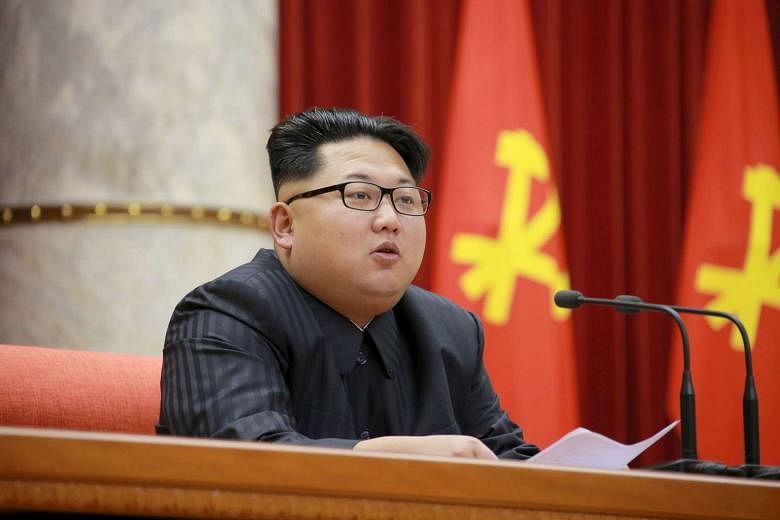SEOUL (Reuters/AFP) - North Korean leader Kim Jong Un blamed South Korea on Friday for increased mistrust in a New Year's speech after a year of heightened tension between the rival countries.
The speech was Mr Kim's fourth since becoming leader in 2011 when his father Kim Jong Il died, sparking a long and turbulent succession process marked by several bloody purges in the isolated country.
"South Korea has made a unilateral case for unification and increased mistrust and conflict between us," Mr Kim said during a 30-minute long address, broadcast on North Korean television, highlighting its suspicion of the South's unification policies.
Mr Kim said in last year's speech he would be open to a summit with Seoul but tension surged in August after a landmine blast on their border wounded two South Korean soldiers. The South blamed the North, which denied responsibility.
The two sides met for talks in August after a sustained military stand-off and agreed to reduce tension and hold further talks at vice-ministerial level, although subsequent negotiations have been fruitless.
On Wednesday, North Korean state media said its top negotiator with the South, Mr Kim Yang Gon, had been killed in a traffic accident. "We should cherish last year's high-level talks and make continued efforts to seek dialogue and not take any further steps backwards," Mr Kim Jong Un said of the August negotiations, adding that he would be open to talks with anyone to discuss "peaceful unification".
Applause was played at various points throughout what appeared to be a pre-recorded message.
Photographs of factories and farms were interspersed with video of Mr Kim standing in a wood-panelled room in front of a red flag bearing the crest of the ruling Workers' Party.
In a response to Mr Kim's speech, South Korea's Foreign Ministry reiterated its position that it was open to talks with the North, the Yonhap News Agency reported.
"North Korea should take note that we are seeking to develop inter-Korean relations and lay the groundwork for peaceful unification," an unidentified government official said.
Speeches by a North Korean leader used to be rare. The voice of Mr Kim's father was only broadcast on state television once, and he made no known public speeches during his 17-year rule.
For years, leaders' speeches were only presented as editorials in state newspapers.
Mr Kim Jong Un, however, has turned to broadcasting his speeches and using them to deliver his message. He speaks in a style similar to that of his grandfather, founding president Kim Il Sung.
The tradition of a New Year's address was started by Mr Kim's grandfather, but discontinued during the rule of his father.
The content is always closely parsed by observers seeking clues to any shift in internal and external policymaking and the leadership's thinking.
Mr Kim Jong Un also said raising living standards was his No. 1 priority, but avoided any explicit reference to the country's nuclear weapons programme.
Impoverished North Korea is under heavy United Nations sanctions related to its nuclear and missile programmes.
There was a mention of the importance of developing "varied" military strike options, but the thrust of the speech was economic development in the isolated, cash-strapped state.
"The Workers Party of Korea gives top priority to the issue of improving people's living standards among millions of other national tasks," Mr Kim said.
"We must create a turnaround in economic development," he said, stressing the need to improve production and efficiency in a range of sectors from energy to agriculture, livestock and fisheries.
Mr Kim has issued similar calls in his three previous New Year addresses and, as on those occasions, Friday's speech offered little in terms of specific policy for achieving his economic objectives.
Since taking over power, Mr Kim has prioritised economic development in a way that his father, with his "military first" policy, never did.
In his very first public address, at a military parade in April 2012, Mr Kim had said he was determined that North Koreans would "never have to tighten their belts again".
He has relaxed some controls on farmers and state-run firms, and set up more than a dozen special economic zones.
And a closely monitored but tolerated grassroots capitalism, born out of a spirit of survivalist self-sufficiency that got many through the catastrophic failure of the state distribution system in the famine years of the mid-to-late 1990s, has given rise to a growing entrepreneurial class.
While North Korea does not release official economic data, South Korea's central bank estimated its economy expanded 1 per cent in 2014.
But the North remains a deeply impoverished country with a gross national income estimated at just 2.3 percent of the South's.
And there is a stark urban-rural divide in living standards, with malnutrition still a serious problem in the countryside.
Friday's speech kicked off a year that will see the first congress of North Korea's ruling Workers' Party to be convened for 35 years - another rare opportunity to signal any significant policy shifts or reshuffle the party leadership.
The formal party gathering - only the seventh of its kind since the official founding of the party in 1945 - will be held in May. The last congress was held way back in October 1980.

